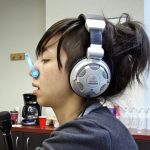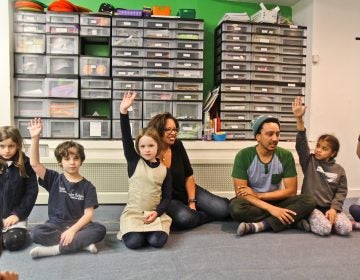Dyscalculia — the math version of dyslexia
A little-known learning disability is helping kids — and adults — reframe their struggles with numbers.
Listen 03:39
A student is struggling with his math homework. (dolgachov/BIGSTOCK)
Whitney Donielson’s troubles with math started when she was in second grade. Her class was learning the multiplication tables — an exercise in rote memorization that her teacher would test using timed quizzes.
“We had to do as many multiplication problems as we could in a minute,” Donielson remembered. “I always just did so poorly on those.”
No matter how much she reviewed, it seemed she couldn’t get the numbers to stick in her head.
“I think that was a start of math being just a struggle and a source of anxiety for me,” she said.
Things only got worse as Donielson grew older. She struggled to remember not just numbers, but formulas and equations. Written calculations were no better — she had a habit of transposing numbers, mixing up digits, addling equations while copying them from one piece of paper to another.
Her parents hired a tutor, but Donielson continued to fall further and further behind. It became normal for her to spend recess in a classroom, finishing up math worksheets that her classmates had whizzed through with ease.
Donielson’s mother — herself a former teacher — began to suspect that her daughter might have a learning disability.
“She would just watch how hard I struggled and how frustrated I would get,” Donielson said. “She knew I was trying.”
There were other signs, too — things that Donielson’s mother began to suspect could be related.
“I had trouble reading a round clock face,” Donielson said. “I got lost really easily. I didn’t have good depth perception, almost — like I would knock over milk and stuff at the table.”
So in fourth grade, Donielson’s mother had her tested. The result: a diagnosis of dyscalculia (pronounced: dys-cal-CYOO-lia), a learning disorder that’s widely described as the mathematical equivalent of dyslexia.
Though scholarship on the two disorders emerged around the same time — the 1970s — dyscalculia never won the same level of attention as its better-known cousin.
But in recent years, that’s slowly started to change. Among those turning their attention to the disorder is Daniel Ansari, head of the Numerical Cognition Laboratory at the University of Western Ontario in Canada. Ansari is a psychology researcher who uses brain imaging to study the neurobiology of mathematical thinking. Or in the case of dyscalculia, he wants to understand what’s going on in the brain when math thinking gets stymied.
“The basic principle is that we’re referring to a group of individuals who have very severe difficulties in learning even the most basic aspects of math,” Ansari said.
How those difficulties are expressed depends on age, among other factors, and can include everything from counting to word problems, mental math to making change. But researchers have honed in on a few of the underlying hallmarks.
“What most of these kids have in common is they struggle to understand a number,” Ansari said. “And by number, I mean the relationship between symbols and quantities.”
For example, they may struggle to link the Arabic numeral 5 to the concept of a defined quantity, much less the idea that it could apply to any five items out there in the world.
That, in turn, can confuse even the simplest mathematical judgments — such as which of two numbers is bigger, or whether a sequence of numbers is in order.
Other common experiences, such as poor coordination or problems with visual-spatial processing, have been widely reported but have yet to be confirmed by the research to be symptoms of dyscalculia.
Then there are bigger unanswered questions — like what causes dyscalculia, and whether it’s a singular disorder.
Despite the lack of answers, the diagnosis itself can be a major help, says Whitney Donielson. Her diagnosis opened the door to new strategies and accommodations. And it changed how Donielson felt about herself.
“I didn’t feel stupid anymore,” she said. “I was finally told that this thing that was so hard for me wasn’t my fault, and I didn’t just need to try harder.”
Not everyone gets that relief. Daniel Ansari said he receives emails from people around the world who have never received an official diagnosis, or heard of dyscalculia in the first place.
“Many of them will tell me, ‘I was always told that I was stupid. I felt like I couldn’t perform in school at all,’ ” Ansari said. “And of course, that’s very tragic because developmental dyscalculia doesn’t mean that a child or an adult is academically challenged across domains.”
In other words, they may excel in other areas — and many do. Donielson, for example, says she always had a knack for writing, and ended up pursuing studies and jobs that played to her strengths.
She still struggles with math, but has developed workarounds — as best she can.
“It’s still definitely, if not a disability, a significant challenge in my life on a day-to-day basis,” Donielson said. “The thing about dyscalculia is that it doesn’t go away as an adult — you just get better at hiding it, or coping with it.”
WHYY is your source for fact-based, in-depth journalism and information. As a nonprofit organization, we rely on financial support from readers like you. Please give today.







